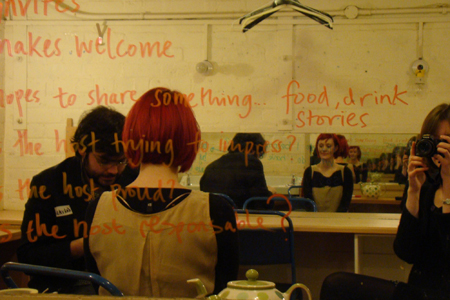Reflecting on New Research Trajectories
Rebecca Gamble | Host, Guest, Stranger | 15 December 2010
We have just submitted the Evaluation Report of New Research Trajectories – the Beyond Text student initiative I helped coordinate – to the AHRC. Unfortunately, I had to miss our evaluation meeting at Nottingham Contemporary, which a number of key participants also attended. My co-coordinators, Heather, Rachel and Becie, therefore deserve most of the credit for putting this report together, which provides an excellent summary and critical assessment of the initiative. However, it is also an appropriate moment for me to personally reflect on my own experiences as a coordinator and participant.
The nature of engagement in a collaborative project like this is determined to a certain extent by how much one exposes oneself to new experiences; be it new ways of thinking, engagement in activities, or opportunities to learn new skills. It is perhaps inevitable that time constraints dictate that the need to ‘get the job done’ frequently outweighs opportunities for expanding one’s practices and perspectives. Hence, we end up performing certain tasks with which we are most familiar or competent.
I was quite heavily involved in setting up the main website (in WordPress) and the various other online spaces and social media platforms we explored throughout the project. That said, it was immensely satisfying to see the other coordinators actively engage in these activities, and to hear examples of how it was subsequently influential in their own skills development. In addition, I did encounter some new challenges in developing online sites; some of which were situated around specific problem-solving (such as embedding the participants’ Tumblr blog into our main website), or generic concerns around encouraging creative forms of participation and documentation (which was not always successfully realised).
With limited previous experience in organising events, I found the scope and ambition of New Research Trajectories – with its multiple events and locations – slightly daunting. I learnt a great deal from my co-coordinators, who are far more experienced in this area than me. On many occasions, they would think of the most seemingly trivial things that collectively contributed greatly to the success and smooth running of the events. They demonstrated similar expertise in managing promotional activities and the limited budget.
I’m not sure we can categorise most of the skills exchanges that occurred in New Research Trajectories as ‘formal training.’ Had we had more time, we may have been able to formalize a more structured and purposeful ‘training’ agenda, which may have resulted in extending ourselves out of our own ‘comfort zones’ a little more. That said, possibly some of the most valuable experiences were gained through osmosis; i.e. being around people performing specific tasks rather than necessarily being active in performing those tasks oneself, or at least participating in a peripheral way.
Generally, we collaborated well to negotiate the various challenges of the initiative, despite the individual demands of our own doctoral programmes, and I would have no hesitation in working with any of my co-coordinators again. But New Research Trajectories would have been nothing without the postgraduate students who came on board with the creative input and momentum necessary to shape the initiative through their ongoing support and active participation.
Whilst New Research Trajectories has effectively ended as a funded initiative, we are looking into ways we can continue to encourage and support the self-sustainability of the informal network of postgraduate students we have established. In particular, whilst the website and social media platforms we created sufficiently served to help promote the initiative and facilitate a limited amount of online discussion, we are conscious that – compared to the city environment – there was a relative lack of participatory engagement with the online as a creative or productive space. This may be a focus in any further discussions.
In summary, New Research Trajectories provided me with an excellent opportunity to participate in a project that engaged with peers from a number of disciplines and institutions, and a range of methodologies and ways of working, and in doing so, highlighted the potential rewards and difficulties associated with interdisciplinary and explorative forms of research practice and collaboration; areas I would be happy to explore further in my post-doc activities.
Photo: Rachel Walls


